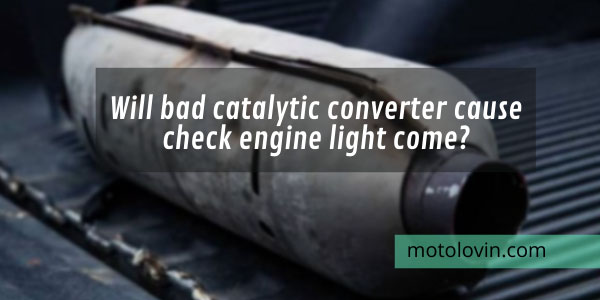As an automobile expert with years of experience, I’ve encountered numerous questions from concerned drivers regarding their vehicles’ check engine light illuminating unexpectedly. One common query that frequently arises is whether a faulty catalytic converter can trigger the check engine light. In this article, I’ll delve into this topic and provide you with a comprehensive understanding of how a bad catalytic converter can indeed cause the check engine light to come on.
Will a Bad Catalytic Converter Cause the Check Engine Light to Come On?
Yes, a malfunctioning catalytic converter can be a significant reason for the check engine light to illuminate on your dashboard. The catalytic converter plays a crucial role in reducing harmful emissions from your vehicle’s exhaust gases. It converts harmful pollutants like carbon monoxide, nitrogen oxides, and hydrocarbons into less harmful substances like carbon dioxide, nitrogen, and water vapor.
When this essential emission control device begins to fail, it can trigger the check engine light, signaling that there is an issue with the vehicle’s emissions system.
Understanding the Catalytic Converter’s Function:
Before we delve deeper, let’s briefly understand how the catalytic converter works. It consists of precious metals, such as platinum, palladium, and rhodium, arranged in a honeycomb-like structure.
As the exhaust gases pass through this honeycomb, the metals facilitate chemical reactions that transform harmful pollutants into safer compounds. This process is vital for minimizing the environmental impact of your vehicle and ensuring it complies with emission regulations.
Potential Causes of Catalytic Converter Failure:
Several factors can lead to the deterioration of the catalytic converter over time. One common cause is excessive amounts of unburnt fuel entering the exhaust system.
This can happen due to issues like a faulty oxygen sensor, malfunctioning spark plugs, or a clogged air filter. Additionally, engine misfires, oil or coolant leaks, and even physical damage to the converter can contribute to its failure.
Effects of a Faulty Catalytic Converter:
When the catalytic converter starts to malfunction, it hampers the proper conversion of harmful emissions, leading to increased pollutant levels in the exhaust gases.
Apart from negatively impacting the environment, this can also result in reduced fuel efficiency and engine performance. Moreover, modern vehicles are equipped with an On-Board Diagnostics (OBD) system, which continuously monitors various components, including the catalytic converter.
When an issue is detected, the OBD system triggers the check engine light to alert the driver about the problem.
Importance of Addressing the Issue Promptly:
If the check engine light illuminates due to a faulty catalytic converter, it’s crucial not to ignore the warning. Continuing to drive with a malfunctioning converter can lead to further damage to the engine and other emission control components.
Additionally, it’s essential to note that a check engine light might not only be related to the catalytic converter. Therefore, it’s advisable to have a professional mechanic perform a comprehensive diagnostic test to pinpoint the exact issue and address it accordingly.
Conclusion:
Understanding the significance of a properly functioning catalytic converter is vital for maintaining your vehicle’s performance, reducing harmful emissions, and ensuring compliance with environmental regulations. If your check engine light comes on, especially due to a faulty catalytic converter, it’s best to seek professional assistance promptly. Regular maintenance and addressing issues early on can prolong the life of your vehicle and contribute to a cleaner and greener environment. Remember, a well-maintained car not only benefits you but also the planet we all share. Drive responsibly, and keep those emissions in check!
